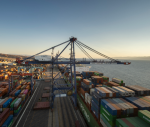You are here
Moscow vies for Arctic clout with nuclear icebreaker fleet
By AFP - Sep 11,2021 - Last updated at Sep 11,2021

Environmental groups have slammed the race for hydrocarbons and the increased presence of nuclear reactors in the already fragile Arctic (AFP photo)
MOSCOW — As Arctic ice cover recedes with climate change, Russia is pinning its hopes for supremacy in the warming region on a fleet of giant nuclear-powered icebreakers.
Moscow sees the development of the Arctic as a historic mission and already has huge projects to exploit its natural resources.
Its next big plan is for year-round use of the Northern Sea Route, a shipping lane through Arctic waters Russia hopes could rival the Suez Canal.
Here are some key facts about Russia's plans for the Arctic:
Historic ambitions
As an icebreaker called the "50 Years of Victory" left the port of Murmansk for the North Pole this summer, its captain told an AFP journalist on board that Russia has a special role to play in the Arctic.
"A third of our territory lies above the Arctic Circle. Our ancestors have long mastered frozen waters. We are continuing this successfully," Dmitry Lobusov said.
President Vladimir Putin has made the development of the Arctic a strategic priority and state companies such as Gazprom Neft, Norilsk Nickel and Rosneft already have major projects in the Arctic to extract oil, gas and minerals.
"The Arctic region has enormous potential," Russian Deputy Prime Minister Alexander Novak said earlier this month.
"In terms of resources, we're talking about 15 billion tonnes of oil and 100 trillion cubic metres of gas. Enough for tens if not hundreds of years," he said.
Suez alternative
The Northern Sea Route links the Pacific to the Atlantic through Russian Arctic waters.
It is not currently navigable year-round without the help of icebreakers, though in summer some specialised classes of ships can pass through.
With the ice cover receding, Moscow is aiming for year-round navigation by 2030.
The route between east Asia and Europe is considerably shorter than through the Suez Canal.
When a huge container ship blocked the busy Suez shipping lane in March, Moscow touted the Northern Sea passage as a "viable alternative".
Russia hopes to boost traffic through the route from nearly 33 million tonnes of cargo in 2020 to 80 million tonnes by 2024 and 160 million by 2035 -- still a long way off from the billion tonnes that pass through the Suez Canal every year.
Russia's state atomic energy corporation Rosatom, which is developing the route and icebreaker fleet, says 735 billion rubles ($10 billion/8.5 billion euros) will be invested by 2024, including 274 billion rubles in state money.
Growing fleet
Rosatom, which already has a fleet of five icebreakers and a container ship, is building four more nuclear-powered vessels within the next five years.
Each ship costs more than $400 million (340 million euros) to build. Construction requires more than 1,000 people and takes five to seven years.
The ships are designed to resist extreme weather conditions, towering 52 metres high with a length of 173 metres and able to smash through ice up to 2.8 metres thick.
No other country operates a comparable fleet, with the United States and China mostly using diesel-electric icebreakers.
Environmental worries
Environmental groups have slammed the race for hydrocarbons and the increased presence of nuclear reactors in the Arctic -- an already fragile ecosystem dramatically affected by climate change.
Greenpeace has said that "the incident-ridden history of Russian nuclear icebreakers and submarines" should cause alarm.
"Of course, risks arise when implementing projects in such a fragile ecosystem," Rosatom told AFP in a statement in response to environmental concerns.
But, it said, the "economic opportunities for both the local population and global economy" of the Northern Sea Route exceed environmental risks.
Related Articles
MOSCOW — Russia has been launching major investments and building up its military presence in the Arctic as it steps up its drive to develop
SAINT PETERSBURG — Russia's nuclear-powered icebreaker Arktika, touted as the most powerful of its kind and a symbol of Moscow's Arctic ambi
MOSCOW — Two crew members are missing after a Russian state-owned cargo ship sank in international waters in the Mediterranean after a

















